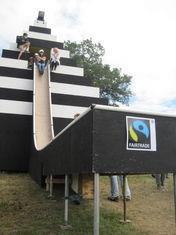
It’s Friday afternoon at The Big Chill festival and a three-tiered, wooden step pyramid is being repaired after a “slightly large lady” - as described by one onlooker - damaged the slide, which provides an exit to the structure. Not your average day in the fresh produce world, but an event that could signal an important stage in the development of the UK trade.
The structure is named the Ziggurat of Flavour and has been conceived in a partnership between trendy “food architects” Bompas and Parr, the Arts Council, organisers of the The Big Chill and the Fairtrade Foundation. The wooden tower sits atop a steep hill within the Eastnor Castle Deer Park in Herefordshire and is home to none other than a fruit cloud. Using the same technology as Antony Gormley’s Blind Light exhibition, foodie duo Sam Bompas and Harry Parr created a chamber of colourful gas through which visitors can imbibe fruity fumes that have been created from Fairtrade fruit. The vapour is aimed at giving people their 5 A DAY in an innovative way (a claim that is only put forward in a less than serious manner) and marks the beginning of the Fairtrade Foundation’s Power Up Your Fruit Bowlcampaign.
At some point during the Fairtrade phenomenon’s rapid rise - unabated by the recession - the realisation is likely to have dawned that, in the produce category, the task in the UK is almost as big as the task of aiding smallholders in some of the world’s poorest countries. The new campaign aims to drive fruit sales across the board and open consumer eyes to the 18 products beyond bananas - including grapes, oranges, lemons, pineapples, mangoes and melons - which have become synonymous with the movement. Fairtrade’s work with companies such as Sun Orange Farms in South Africa to tackle issues such as high AIDS and low adult literacy counts provides invaluable development and is a fact that should not be lost in the day-to-day business of dealing with the category.
The campaign, although ostensibly driving people towards Fairtrade products, could represent a boost to fresh produce as a whole and some have suggested there may be an opportunity for a link-up with wider, government-led campaigns. But it seems likely that the impetus behind the campaign will have to come as much from the retailers as the government and consumers.
Talks are ongoing about how the drive will manifest itself but it is thought that several eminent sports stars will be enlisted to front the campaign in the autumn, a move with important health links that will doubtless attract attention from retailers and consumers as the nation gears up for the delirium of a home Olympic Games. By the beginning of the games, in 2012, the foundation hopes that 50 per cent of the banana market will be Fairtrade and it has been confirmed that all the bananas used on Olympic sites will be Fairtrade certified.
The Fairtrade Foundation’s head of business development, Mark Varney, says: “This campaign is about helping people to understand the added value that Fairtrade fruit can bring. Not only does eating Fairtrade fresh fruit contribute to your own healthy lifestyle, but you are also making a positive difference to the lives of farmers, workers and their communities by helping to ensure that they are paid a fair price or fair wage for their work and can therefore make a sustainable living.
“There are no real brands in fresh produce,” Varney argues. “So there is an opportunity for us to develop the organisation and build up the brand loyalty that you see in other sectors.”
One accusation often levelled at Fairtrade is that categories are difficult to grow without year-round supply of Fairtrade-certified product. Varney says this has more to do with education than supply issues. “The important thing is to teach people about seasonality - there is a seasonal calendar on our website - and when products are in season.”
A further issue - and one that the Fairtrade Foundation is undoubtedly working hard to address - remains that without consumer demand, oversupply could gut the Fairtrade market. Retail prices still dictate the business, even when taking the premium into account, so if too many Fairtrade producers are listed then returns may come under pressure. The organisation is at a critical juncture and its move to take on the difficult category of fruit - having seen such success in coffee and tea, in particular - is admirable. The question remains whether consumers around the globe are equally up to the challenge.



